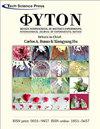Ectopic Overexpression of EuCHIT30.7 Improves Nicotiana tabacum Resistance to Powdery Mildew
IF 1.2
4区 生物学
Q3 PLANT SCIENCES
Phyton-international Journal of Experimental Botany
Pub Date : 2023-01-01
DOI:10.32604/phyton.2023.031175
引用次数: 0
Abstract
Various strains of powdery mildew (PM), a notorious plant fungal disease, are prevalent and pose a significant threat to plant health. To control PM, transgenic technology can be used to cultivate more resistant plant varieties. In the present study, we utilized the rapid amplification of cDNA ends (RACE) technique to clone the full-length cDNA sequence of the EuCHIT30.7 gene to explore plant genes with disease resistance functions. Bioinformatics analysis revealed that this gene belongs to the GH18 family and is classified as a class III chitinase. The EuCHIT30.7 gene is expressed throughout the Eucommia ulmoides plant, with the most abundant expression in male flowers. Subcellular localization analysis indicated that the protein encoded by this gene was detected within both the cell membrane and cytoplasm. Upon PM inoculation, overexpression of EuCHIT30.7 in tobacco plants led to a significantly reduced relative lesion area and a decreased spore count compared to both wild-type and empty vector control plants. Activities of the protective enzymes, namely, peroxidase (POD), superoxide dismutase (SOD), catalase (CAT), and phenylalaninammo-nialyase (PAL), in tobacco plants overexpressing EuCHIT30.7 were significantly greater than those in wild-type and empty vector tobacco plants. Furthermore, the rate of increase in malondialdehyde (MDA) content was significantly lower in tobacco plants expressing EuCHIT30.7 compared to control tobacco plants. In EuCHIT30.7 transgenic tobacco, the expression of pathogen-related protein genes, namely, PR2, PR5, PR1a, PDF1.2, and MLP423, along with the tobacco PM negative regulatory gene, MLO2, were significantly higher compared to control tobacco plants. These findings suggested that EuCHIT30.7 significantly enhances the resistance of tobacco to PM.EuCHIT30.7异位过表达提高烟草对白粉病的抗性
白粉病是一种臭名昭著的植物真菌疾病,各种菌株普遍存在,对植物健康构成重大威胁。为了控制PM,可以利用转基因技术培育更具抗性的植物品种。本研究利用RACE技术克隆EuCHIT30.7基因的全长cDNA序列,探索具有抗病功能的植物基因。生物信息学分析表明,该基因属于GH18家族,属于III类几丁质酶。EuCHIT30.7基因在杜仲整个植物中都有表达,在雄花中表达量最多。亚细胞定位分析表明,该基因编码的蛋白在细胞膜和细胞质中都能检测到。接种PM后,与野生型和空病媒对照植株相比,EuCHIT30.7在烟草植株中过表达,导致相对病变面积和孢子数显著减少。过表达EuCHIT30.7的烟草植株中过氧化物酶(POD)、超氧化物歧化酶(SOD)、过氧化氢酶(CAT)和苯丙氨酸氨分解酶(PAL)的活性显著高于野生型和空载体烟草植株。此外,表达EuCHIT30.7的烟草植株丙二醛(MDA)含量的增加速率显著低于对照烟草植株。在EuCHIT30.7转基因烟草中,病原体相关蛋白基因PR2、PR5、PR1a、PDF1.2、MLP423以及烟草PM负调控基因MLO2的表达量均显著高于对照烟草。这些结果表明,EuCHIT30.7显著增强了烟草对PM的抗性。
本文章由计算机程序翻译,如有差异,请以英文原文为准。
求助全文
约1分钟内获得全文
求助全文
来源期刊
CiteScore
1.90
自引率
11.80%
发文量
17
审稿时长
12 months
期刊介绍:
Phyton-International Journal of Experimental Botany is an international journal that publishes on the broadest aspects of plant biology and ecology. The journal welcomes the original and exciting submissions that provide new and fundamental insights into the origins, development, and function of plants from the molecular to the whole organism and its interactions within the biotic and abiotic environment. Phyton-International Journal of Experimental Botany publishes outstanding research in the plant and ecology sciences, especially in the areas of plant physiology and biochemistry, plant metabolism, plant ecology and evolution, as well as those making use of synthetic, modeling, bioinformatics, and -omics tools. Manuscripts submitted to this journal must not be under simultaneous consideration or have been published elsewhere, either in part or in whole.

 求助内容:
求助内容: 应助结果提醒方式:
应助结果提醒方式:


